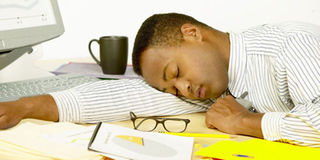Dreaming of a good night’s sleep?

The meals are hot; the fridge is full, the rent is free, which could be why the young man has maintained the status quo.
Are you struggling to sleep, or not getting enough rest even if you fall asleep? Sleep is a critical function, and without it, we’re irritable, tired and dull.
Sleep needs vary from person to person, but the optimal average is seven to nine hours.
Studies done on sleep continue to link poor sleep patterns with several health conditions, including Alzheimer’s and mental deterioration. Interestingly, it is not only too little sleep that’s damaging to the body. The studies have also found that excessive sleeping can actually affect one’s memory, and cause diminished memory skills in older people.
These are some of the reasons you may be having difficulty falling asleep and their solutions.
Staying up too late: Prepare yourself mentally for sleep by starting to prepare for bed early, which may mean wearing your pyjamas, getting into bed and dimming the lights. Try to unwind by deliberately slowing down and doing fewer activities.
High body mass index: Excessive weight gain appears to increase insomnia, and obesity causes obstructive sleep, or sleep apnea, a condition where one stops breathing during the night, thus interrupting sleep. Begin a healthy eating and exercise plan.
Eating or drinking too late into the night: When you have your meals or drinks within an hour or two before sleep, your brain and body stays awake longer because of the activity of digestion.
Your meal composition: Avoid exceeding more than 500 calories especially close to your bedtime. Also eating too much protein in the evening before bedtime causes your body to be more alert than when you have taken carbohydrates, which have a more calming effect.
One of the best things to take to lull you to sleep is milk, which contains tryptophan, a natural dietary sleep inducer. It works by increasing the amount of serotonin, a natural sedative. Adding a teaspoonful of honey, a simple sugar, will help the brain absorb tryptophan.
Caffeine and alcohol: Avoid anything with caffeine after midday as it can stay in your system up to 12 hours and keep you alert for even 20 hours. Alcohol is a sleep disrupter.




